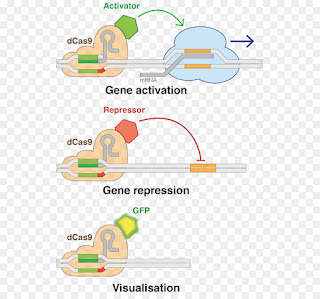WHO proposes framework for a safer, transparent & ethical use of human genome editing tools worldwide!
The World Health Organisation released a two-new companion reports impending the first global recommendations to fortify human genome editing mechanism with safety, effectiveness and ethics for its proper use in public health practices.
The forward-looking new reports
result from the first broad, global consultation that spanned over two years,
involving hundreds of participants representing diverse perspectives from
around the world, including scientists and pioneering researchers, patient
groups, faith leaders and indigenous peoples to draw a comprehensive and
inclusive approach over the ethical and clean practices of human genome editing
in the underlying areas of somatic, germline and heritable tissues.
“Human genome editing has the potential
to advance our ability to treat and cure disease, but the full impact will only
be realized if we deploy it for the benefit of all people, instead of fuelling
more health inequity between and within countries,” stated Dr. Tedros Adhanom Ghebreyesus,
Director-General, World Health Organisation.
To ascertain governance and positioning control over the use of applications of genome-based techniques like CRISPR-Cas9 at the local, regional and international level, the World Health Organisation had to get ahead of the curve to check the ethics and principles involved in the human genome editing practices in the field of medicine and research.
The Expert Advisory Group on developing
Global Standards for Governance and Oversight of Human Genome Editing, (hereafter
called the Committee) was established way back in December 2018 even before the
creation of science division at the World Health Organisation in March 2019.
“Potential benefits of human
genome editing include faster and more accurate diagnosis, more targeted
treatments and prevention of genetic disorders. Somatic gene therapies, which
involve modifying a patient’s DNA to treat or cure a disease, have been
successfully used to address HIV, sickle-cell disease and transthyretin
amyloidosis. The technique could also vastly improve treatment for a variety of
cancers such as thalassemia,” mentioned Dr. Soumya Swaminathan, Chief
Scientist, WHO.
The human genome technique
manipulates the DNA of the foetus to prevent passing of any of the diseases
from its mother or father and make the unborn potentially resistant. However, these
techniques do involve some risks, for instance, germline and heritable based human
genome editing, could alter genomic structure of human embryos that could be
transferred on to successive generations leading to change in traits and behaviours
of following generations.
“These new reports from WHO’s Expert Advisory Committee represent a leap forward for this area of rapidly emerging science,” added Dr. Swaminathan. She further asserted, “As global research delves deeper into the human genome, we must minimize risks and leverage ways that science can drive better health for everyone, everywhere.”
The CRISPR/cas9 mechanism is
based on RNA-guiding targeting approach and is considered to be first-of-its-kind
in the editing of human genome. But, its discovery since 2012, for its use in
precision gene editing has raised and marked certain ethical concerns over its
use in editing human genes, its accessibility, its safety, enforcement of rules
and regulations etc.
Dr. Margaret Hamburg, Co-Chair,
former Commissioner of the U.S. Food and Drug Administration and former Foreign
Secretary, National Academy of Medicine, United States of America stressed on
the importance and potential benefits of using new tools and methods, for
example, human genome editing and research to combat serious diseases during
challenging times like COVID pandemic. But, she clearly highlighted that these
technologies should be developed carefully with robust testing quality measures
in place to make a balance between maximised benefits with minimised harm, the
balance between the speeds, innovation and access as these become highly
relevant to human genome editing.
The published
reports incorporated recommendations on the governance and oversight of human
genome editing in basically nine discrete areas, including human
genome editing registries; international research and medical travel; illegal,
unregistered, unethical or unsafe research; intellectual property; and
education, engagement and empowerment. The recommendations focused on
systems-level improvements needed to build capacity in all countries to ensure
that human genome editing is used safely, effectively, and ethically.
Additionally, the documents
mentioned a new governance framework identifying specific tools, institutions
and scenarios to illustrate practical challenges in implementing, regulating
and overseeing research into the human genome, offering concrete
recommendations for dealing with specific scenarios such as:
Ø
A hypothetical clinical trial of somatic human
genome editing for sickle cell disease proposed to take place in West Africa
Ø
Proposed use of somatic or epigenetic genome
editing to enhance athletic performance
Ø
An imaginary clinic based in a country with
minimal oversight of heritable human genome editing that offers these services
to international clients following in vitro fertilization and pre-implantation
genetic diagnosis
Moreover, WHO needs a global
cooperation from multi-sector stakeholders, agencies, funders, associations and
various other key institutions to develop an accessible mechanism for
confidential reporting of concerns about possibly illegal, unregistered,
unethical and unsafe human genome editing research, and other activities like
medical tourism and issues on some undesirable intellectual property rights. Alongside, better monitoring of clinical
trials using human genome editing mechanisms forms the next crucial step
towards clean governance.
Other commitments include local and regional webinars to provide a thrust towards education, engagement and empowerment. To enhance an inclusive global dialogue on frontier technologies including cross-UN working and development of web-based resources to offer reliable information on modern tools and techniques including human genome editing, WHO’s Science Division needs a vast coordinated and collaborative approach from other UN agencies, groups, funders, research communities and civil societies at global level under the maintained leadership of the Director-General Dr. Tedros Adhanom Ghebreyesus from addressing public statements related to heritable editing to continue his support and efforts in exploring the opportunities and challenges in this field as it is evolved with further scientific development.




.jpg)

Comments
Post a Comment